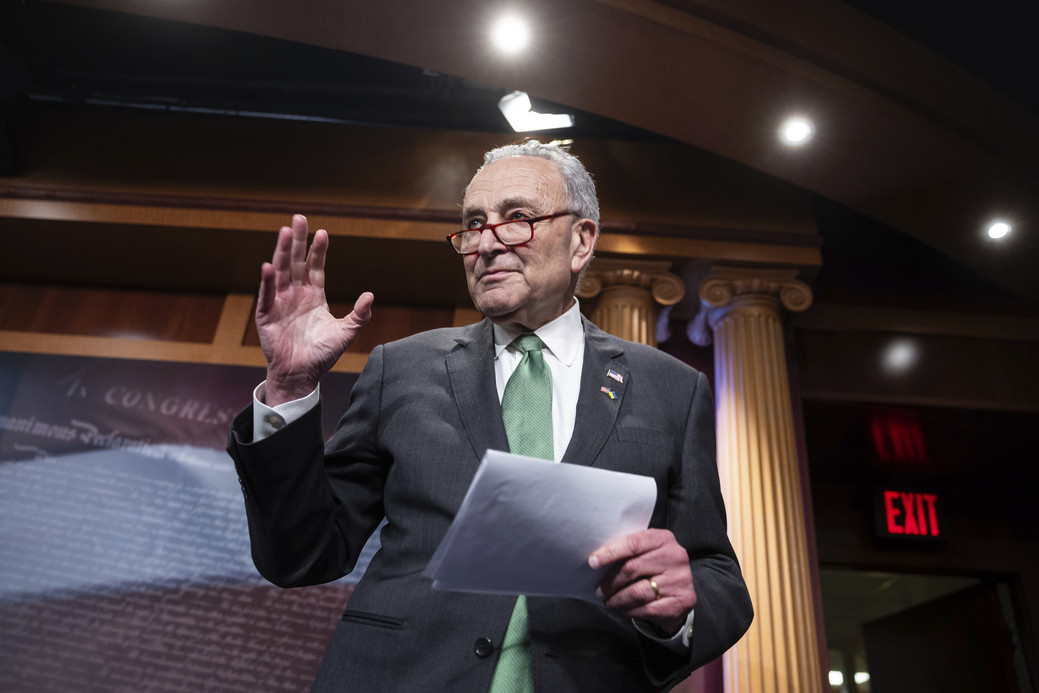“We’ve never ever dealt with anything like this before,” Senate Majority Leader Chuck Schumer said.
A bipartisan group of senators has taken a critical step forward in regulating artificial intelligence, releasing a long-awaited, Chuck Schumer-endorsed “roadmap” for addressing AI that Congress could take up this term.
The bipartisan working group, which consists of Schumer, Sens. Todd Young (R-Ind.), Martin Heinrich (D-N.M.) and Mike Rounds (R-S.D.), has been developing the report for months, looking to outline areas of AI ripe for bipartisan regulation. The quartet hosted a number of AI briefings this term for senators, hoping to educate sometimes tech-averse lawmakers.
Top line AI priorities in the report include:
- Boosting funding for AI innovation
- Tackling nationwide standards for AI safety and fairness
- Using AI to strengthen U.S. national security
- Addressing potential job displacement for U.S. workers caused by AI
- Tackling so-called “deepfakes” being used in elections, and “non-consensual distribution of intimate images”
- Ensuring that opportunities to partake in AI innovation reach schools and companies
“AI is not only complex, but it’s rapidly evolving and it’s so broad in its impact,” Schumer said in a discussion on the report with journalists Tuesday night. “So the longer we wait, the more the gap becomes. … We’ve never ever dealt with anything like this before.”
Those goals would come at a price, though. The report says the eventual goal would be to spend “at least $32 billion per year for (non-defense) AI innovation,” as recommended by the National Security Commission on Artificial Intelligence in a 2021 report. But the senators emphasized that would be over a number of years.
“I think when you’re talking about AI, they’re going to upgrade the old message of ‘you could be penny-wise and pound-foolish,’” Rounds said. “In this case, it may very well be, you could be billions-wise and trillions-foolish.”
Schumer and the rest of the working group said the plan is to have individual committees move forward with the parts of the report relevant to their jurisdiction. The Senate majority leader also said the plan is not to wait on a larger package to come together — and instead to be flexible on moving smaller bills individually if they’re ready to go.
Schumer did indicate one area of legislating that was particularly high up on the priority list: Addressing the use of AI in elections. He did not specify timing on that legislation on the floor, however.
Of course, it’s a huge jump from a report to passing bills through both chambers — particularly in this split Congress. The Senate is going to be largely unfriendly territory for legislating these next few months and will be gone for weeks at a time this fall. And while the group said it is hoping for buy-in from the House, the House is a bit unpredictable nowadays, to say the least.
The Senate’s next deadline for must-pass legislation isn’t until fall, on government funding and the farm bill, meaning AI provisions won’t be able to hitch a ride on more comprehensive legislation for a while. And with the November elections just around the corner, vulnerable incumbents aren’t going to be looking to vote on much. Any bills that include government spending could have particular holdups.
Still, Schumer has been adamant that he’ll push Congress to act on a bevy of priorities this year, AI included. And there’s always the post-election lame-duck session, where finicky policy can weasel its way through.
Asked about the difficulty of passing policy in an election year, Schumer told POLITICO: “We’re going to have to persuade our colleagues, but we think the arguments are overwhelming.”
Mohar Chatterjee contributed to this report.

